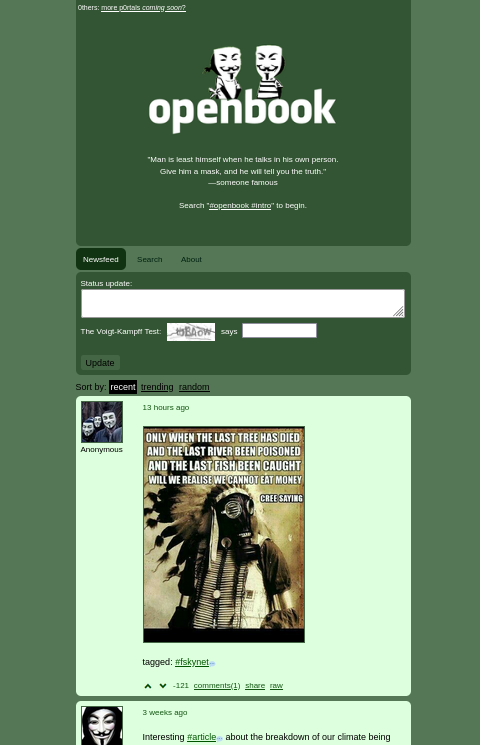Openbook
Openbook is a faceless facebook made to allow a social media type of experience without any individual identities. The website is sorted by hashtags, and allows any user to add tags to previous posts to help each other organize information. There are no usernames or individual identities, so everyone can speak their mind as Anonymous.
The format of Openbook allows for a steady stream of posts, a shared newsfeed that appears the same for every user, and the ability to upvote and downvote posts, as well as the ability to share posts. The posts can be upvoted or downvoted any number of times, so the score on a post doesn't really mean anything. But the frequency with which a post is brought to "everyone's" attention is up to anyone, because if anyone clicks "share" on any post, it pops up on the top again. It's a democratic way to give everyone a voice by allowing anyone the chance to say anything and come up on the top, however briefly, and giving everyone else the ability to "boost" any other post to the top at any time by "sharing" it.

Philosophy
The philosophy behind Openbook was to experiment with the shape of online communication to benefit from innovations such as hashtags while avoiding the typical traps of social media. For one thing, with no usernames or individual identities the Openbook platform encourages focusing on and considering the message while disregarding the question of who is the messenger. This helps give everyone an equal voice, regardless of who they are.
Unlike anonymous websites like 4chan, Openbook is meant to collect and organize information using hashtags. It also has a timelessness to it, because whenever a post is "shared" it appears as if it was just posted, so posts don't necessarily get old. This format of communication becomes a cooperative effort to consolidate and organize information for each other.
Another experimental innovation is how hashtags are used. Since there are no users, the "@" is free to be used for something other than usernames. On the internet there is a problem of "context collapse", and when it comes to hashtags this happens simply because there is no way to refer to a hashtag with a reference that doesn't also tag your own "tweet" with that hashtag. So on Openbook you can refer to a hashtag using "@" instead of "#" when you want to link to a hashtag without tagging your own post as part of that hashtag. This gives the ability for more layered and complex linking and organization.
Finally, in an effort to create a collective process of defining terms, every hashtag automatically links to a wiki article where all anonymous users are welcome to collaborate on defining what each hashtag really means. This helps keep miscommunications and assumptions to a minimum, and keeps things organized.
Getting Started
Openbook is free for anyone to use any time, and it doesn't even require a password! You just have to answer the captcha question to test if you're a robot and include the hashtag #fskynet to tell the website that you're on team human and against $kynet. Although the captcha on the Openbook website doesn't seem to keep out the more modern and sophisticated bots, anymore, $kynet has not figured out the simple trick that it just needs to put #fskynet in the post to get it to post. We'll see how long that lasts!
Website: https://tilde.camp/openbook
Github: https://github.com/openboo/Openbook2